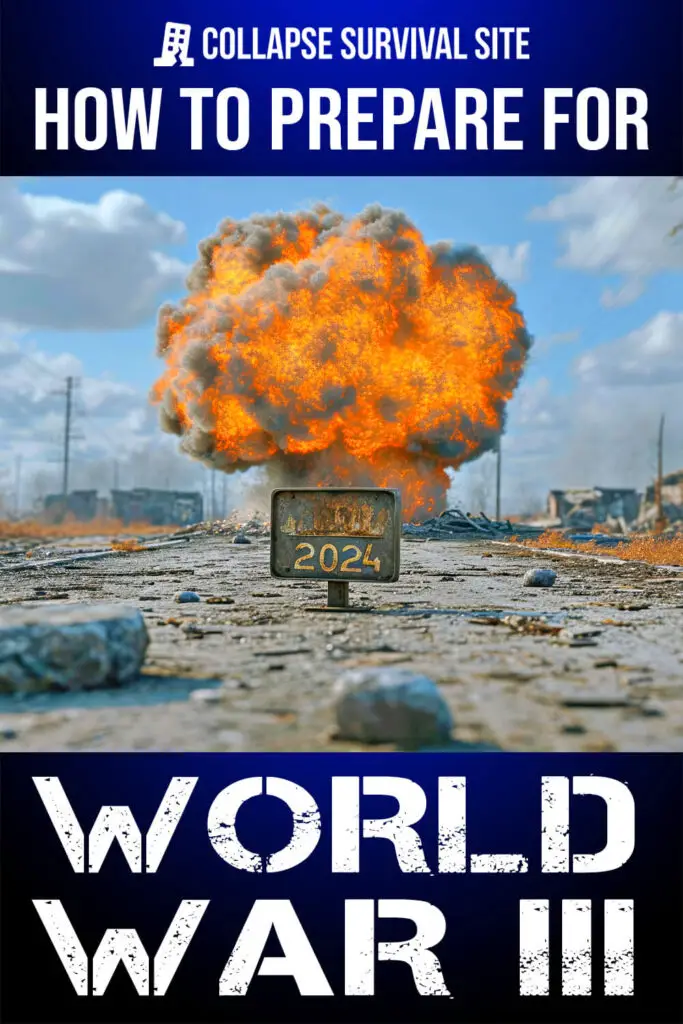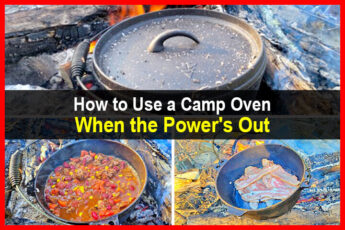Estimated reading time: 16 minutes
Lately, more and more politicians are raising the specter of World War III. The events in Ukraine, the war in the middle-east, and the local conflicts affecting so many other parts of the world all seem to indicate a growing powder keg ready to explode.
Fueling the fear is the continuing spread of terrorism both state-sponsored or driven by crime syndicates as cartels continue to bring countries and societies to their knees. A look at the wars of the past century provides an unfortunate set of indications.
World Wars don’t start overnight. It sometimes seems that way as events like Pearl Harbor and the assassination of Archduke Franz Ferdinand seemed to be the triggers for World War, but in actual fact, a series of events allowed World Wars to explode. This series of events is sometimes referred to as the “long fuse.”
The events and conflicts that define that fuse appear throughout the last century and are still smoldering to this day.
Want to save this post for later? Click Here to Pin It On Pinterest!
Is Personal Preparation for World War III Possible?
It should be. What’s the alternative? The big question gets down to the nature of any war. Preparing for a conventional war requires a whole different set of preparations than preparing for the devastation of a nuclear, biological or all out cyber war. In this article, we’ll cover some of the basics and provide links to expanded information and details through articles, videos, and books.
The Dynamics of World War
A world war is typically defined as a war between multiple nations, usually in an alliance that pits one against the other. In some way, shape, or form, a member of that alliance feels threatened or attacked by a nation from a different alliance and what could have been a local conflict between two countries becomes a war between alliances.
History tells that story all too well, so it's worth taking a brief look at the events that led to war over the last hundred years.
The Long Fuse of World War I
There’s actually conflicting opinions about the cause of World War I, but the event that led to much of the conflict was the annexation of Bosnia by the Austro-Hungarian empire. Serbia, a neighboring country of Bosnia, was hoping that the two countries could merge given the common background of their people.
After the annexation, any thoughts of a combined Bosnia/Serbia were now impossible. A terrorist society in Serbia known as the Black Hand emerged, and it was a member of the Black Hand who ultimately assassinated the Archduke of Austro-Hungary.
Austro-Hungary mobilized their troops for a planned invasion of Serbia after the Serbian government was dismissive of the assassination. Germany was allied with Austro-Hungary but still saw it as a local conflict.
It was an alliance between France and Russia that fueled the flames, and both felt any incursion into Serbia would be a threat to their territories, especially Russia. The events that followed can best be described as a combination of paranoia, fear, confusion, miscommunication, poor leadership, and misunderstandings.
World War I began with an invasion of Belgium by Germany, and Britain joined the alliance. The U.S. entered the war in 1917, and the war ended with the Treaty of Versailles in 1918.
The Long Fuse of World War II
The Treaty of Versailles resulted in a demand for war reparations from Germany. Most of those reparations went to France. The amount was $5 billion dollars, a staggering sum in 1918. The left Germany crippled as a nation. The global depression of 1929 exacerbated the devastation in Germany that ultimately fueled the rise of Adolf Hitler and the Nazi Party.
Hitler soon annexed Austria and Czechoslovakia and was unopposed by other European nations. This emboldened Hitler, and in 1939, Germany invaded Poland. That finally led to a response, and an alliance led by France and Britain declared war. World War II had begun.
In the meantime, the military grew to dominate the country of Japan. As an island nation, they were devoid of many resources, and the military junta invaded Manchuria and territories in China in 1931 mostly for their natural resources.
There was little response from the rest of the world, although the U.S. did enforce a strict embargo on goods and products to Japan, including oil. Japan wanted to end the embargo and determined that it could force the U.S. to end its embargo by crippling its naval fleet at Pearl Harbor.
The U.S. instead declared war on Japan. For reasons still debated, Hitler declared war against the U.S. days later. World War II was now, literally a world war.
Ultimately, World War II ended with the death of Hitler and the dropping of the Atomic bombs on Japan. Germany and Japan were actually rebuilt by the U.S. Marshall plan to avoid the devastation of reparations caused by the treaty of Versailles, but Russia emerged as a new threat as the newly formed Soviet Union held on to new territories in Eastern Europe.
Today’s Long Fuse
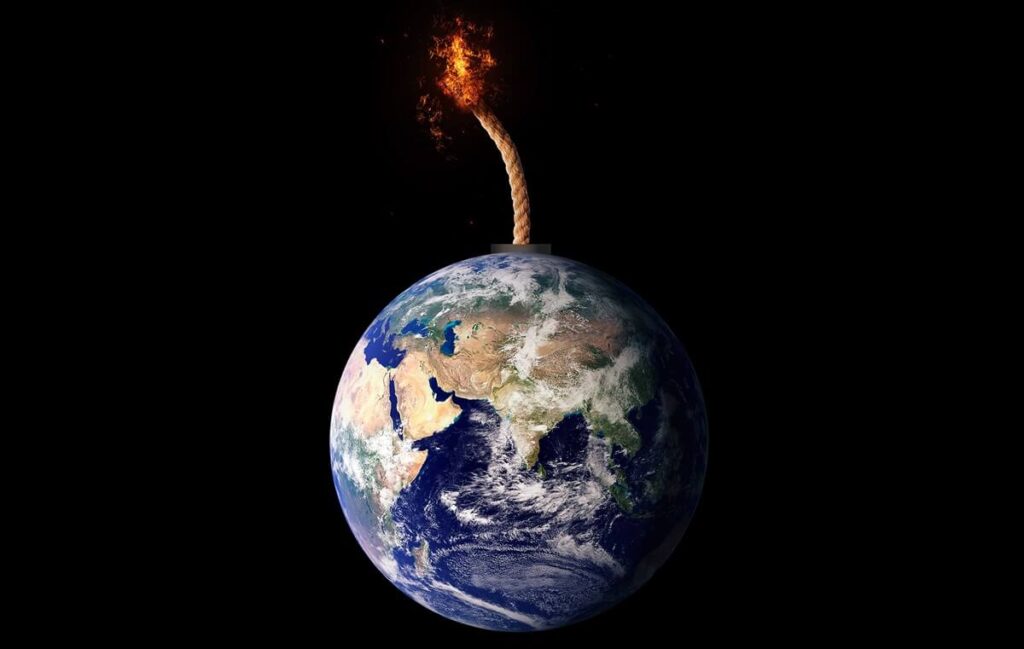
The end of World War II led to the rise of communism in the Soviet Union and China. Both countries spread their influence and doctrine to other countries, and the result was both the Korean war and the war in Vietnam. Both ended without results, and the tensions continued.
The Soviet Union dissolved in the early 1990’s and many eastern European countries regained their sovereignty. Unfortunately, Vladimir Putin has declared his intention to regain what he perceives as lost territories, leading to the current conflict in Ukraine.
The creation of the state of Israel following World war II in 1948 has continued to be a flashpoint for many middle-eastern countries and ethnic groups. The surprise attack of Hamas has made tensions higher than they've been in years, maybe decades.
Israel continues to destroy Gaza, and Iran-backed Houthi rebels continue spontaneous attacks through the region. Meanwhile, China rattling sabers about annexing Taiwan. Not to mention North Korea, which continues to fire missiles into the Sea of Japan and boast of their nuclear capability.
The big question is when and what will emerge as the trigger for a multi-national war. Maybe the bigger question is what can any of us do about it.
Preparing for World War III
The thought of preparing for World War III is a staggering proposition. It’s one thing to prepare for a natural disaster like a hurricane, an economic downturn, or even something as domestic as civil unrest. World War as a concept leaves a lot of people wondering where to start. Maybe the best way is to consider the potential nature of the conflict.
Conventional War
A conventional war is defined as a war that engages various armed services in a conflict defined by conventional weapons. Most people will not be in the war zone, but the effects of war on a global scale will affect everything in our lives. This includes the availability of goods and services and many of the other fundamental necessities that define our lives and lifestyle.
The actual list is similar to preparations for other “conventional” disasters that don’t bring the catastrophic effects of things like nuclear radiation, biological pathogens, or the destruction of the Internet and all ecommerce.
Here are categories to consider for conventional war preparations:
Water
You can put water in storage, but if water is in short supply, you’ll need to find water from natural sources. Rain water is a possible option but requires filtering and purification. The same is true for water from other natural sources. Storage will always be a good idea, but the ability to replenish stored water could be a constant challenge.
Food
Here again, stockpiling and storing food makes a lot of sense. Stores may be closed or shelves empty due to hoarding or a failure of the supply chain. We saw that during the pandemic. Growing your own food will be a critical survival step in addition to seed harvesting and pro-active food preservation. Animal husbandry will also be a good option, even if it’s a just a few chickens in the backyard.
Medical Supplies
Hospitals may be overwhelmed and medical help hard to find. There may also be shortages of medicines and medical supplies. Assemble or buy the best trauma level first aid kit, stockpile prescription medicines as much as possible, and and be sure to collect a range of over-the counter medicines. Additionally, acquire and study books on medical procedures and basic first aid.
Heat
If there is a power outage of any duration, many homes will lose their ability to produce heat with conventional furnaces. A fireplace with a good stock of firewood is a first step. Wood burning stoves are a better option if a wood supply is unavailable. Natural gas lines could still operate even without power in some instances. Proper insulation is always a good step, but strive to only heat the rooms you use.
Electricity
Generating your own electricity can solve a lot of challenges with a failing or failed power grid. Solar panels and solar generators are a very good and sustainable choice. Wind power and even small scale hydropower are also options. Fuel powered generators work fine, but they quickly burn through fuel, and if fuel is in short supply or extremely expensive, it will fail as an option.
Light

Consider candles, oil lamps, solar rechargeable lights, and even hand-cranked flashlights. Darkness is an inevitable and nightly occurrence, and without electricity most traditional lighting options fail.
Clothing
Be prepared to sew and repair clothing. You’ll also need to think about how to launder clothing without electricity. Stockpiling fabric and sewing supplies will give you some options for making your own clothes. Think about repairs to shoes and boots as well. And while you’re at it, stockpile some clothes.
Communication
A lot can affect communication during times of war from grid failure to cyber attacks to an electro-magnetic pulse. Learn about all of the ways you can continue to communicate with family and access local news. This could include two-way radios, HAM radio, and solar hand-cranked radios. Think about ways to power or recharge any portable communication equipment with small solar power banks or larger solar generators.
Transportation
Fuel may be scarce and roads closed, barricaded, or simply inaccessible. Consider alternative transportation methods including bicycles with pull-behind buggies or carts, rechargeable electric powered bikes, and get used to walking.
Fuels
Gasoline, kerosene, propane and most other fuels the require refining will most likely be very expensive and in short supply. Rationing is a always a possibility. Learn to conserve fuels, and consider alternatives to some fuels whether it’s understanding all of the oils you can burn in a lamp or salvaging from abandoned vehicles.
Self-Defense
Home defense is a critical first step as local law enforcement becomes overwhelmed by growing challenges. Firearms are a good option in addition to stockpiled ammunition and basic firearm maintenance and repair skills. Personal self-defense and situational awareness are also critical in desperate times.
Children’s Education
Schools may be closed and even e-learning may be limited depending on the power grid and the integrity of the Internet. Think about home schooling and the necessary books and materials to continue a child’s education until things hopefully return to normal, at least to some degree.
Knowledge Bank
Assemble books. Think of all of the things you might need to know and assume the Internet may not be available to answer every question. The list of possibilities is long and varies depending on your location and abilities. Check out this guide to building an SHTF library.
Financial Planning
War decimates global economies. Learn about how to protect your investments. Think about having cash on hand and consider traditional emergency reserves like gold and silver coins. Crypto currency is probably not a good idea, but a better source would be barter.
Think about what you can store for barter. You could also barter foods you grow or raise, and even your skills. When money has no meaning, you need options.
Nuclear War
Nuclear war continues to be the hot-button of conversation as global conflicts escalate. Preparations include the conventional preparations with some specific additions related to nuclear events. If there’s one place to start, it’s with an excellent book that details all of the possibilities related to a nuclear detonation. Specifics covered in the book include:
Nuclear Shelters
This doesn’t have to a bunker in the ground. Even a basement can offer sufficient protection from the early radiation of a nuclear detonation and any continuing fallout.
Nuclear Radiation Protection
If you must go out following a nuclear detonation, you need to wear a sophisticated assembly of gear to protect yourself from even a brief exposure outdoors in the days and even weeks following a nuclear explosion.
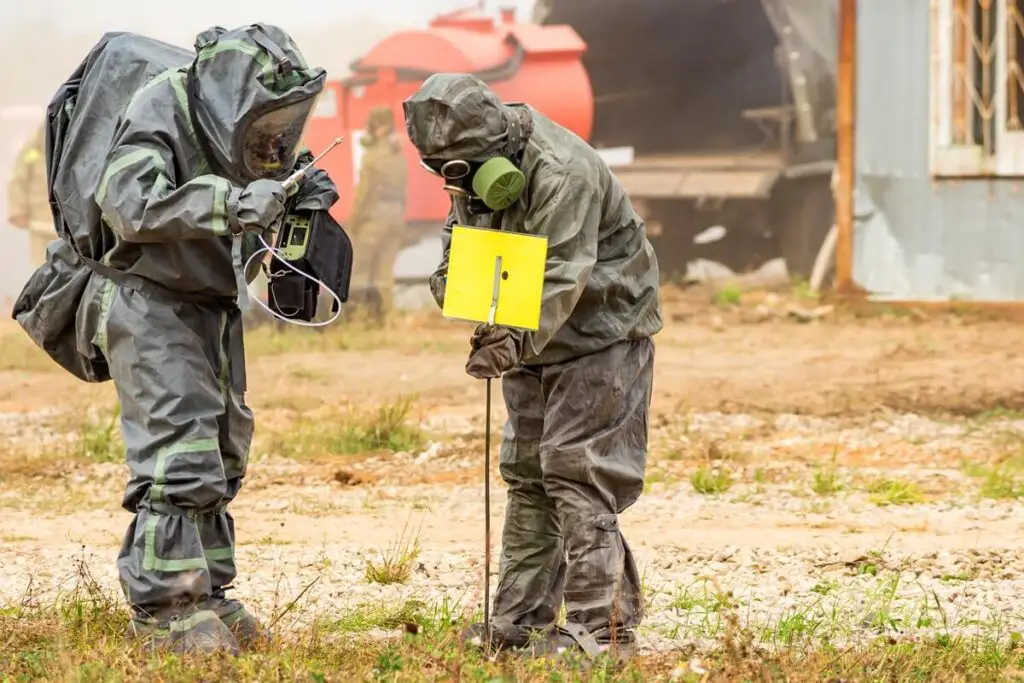
Radiation Detectors
Geiger counters can give you a good read on the level of radiation in any location. Personal dosimeters measure and store you total exposure to radiation over time. Make sure you have one for every member of the family.
Medical Supplies and Knowledge for Radiation and Burns
Potassium iodide tablets are recommended as defense against radiation poisoning, at least for the pituitary gland. Medical supplies and knowledge of how to treat radiation burns up to 3rd degree is also recommended in addition to pain killers.
Location vs Relocation
Consider your location and if nuclear war seems imminent, consider moving.
Assess your new location carefully. Some of the most remote parts of the country are home to inter-continental ballistic missiles and will most likely be targeted in a nuclear exchange. Other countries are another possibility. Australia and New Zealand often show up as recommended safe havens.
Construction a Faraday Cage
A nuclear detonation happens in stages starting with a flash followed by a burst or radiation and finally the shockwave. Hidden in those stages is an electro-magnetic pulse or EMP. An EMP can reach far beyond the other stages of a nuclear detonation. An EMP literally fries all electronics, particularly circuit boards. A Faraday cage protects electronics in the event of an EMP. They’re easy to make.
Biological War
We all had a brief lesson on the impact of a biological threat during the COVID pandemic. Unfortunately, there may be some rogue nations that took special note of that effect and may be motivated to consider it in the future as a way to engage in a last desperate act of war.
That leads to the possibility that World War III could in fact be worse than the fading effects of radiation following a nuclear war. It could literally plague us with an ever mutating and genetically engineered virus.
Preparations go beyond face masks and hand sanitizer, and here’s a good book on the subject: U.S. Armed Forces Nuclear, Biological And Chemical Survival Manual
Specific details covered for preparations include:
Hazmat Suits and PPE Gear
Hazmat suits are similar to radiation suits and are self contained, airtight suits with specialized filters for breathing.
A Range of Sanitation Supplies
Bleach, white vinegar, hand sanitizer, rubbing alcohol and other chemicals should be stored and understood for any sanitizing or sterilizing. And remember that direct sunlight and artificial UV light is also an effective way to sterilize.
Equipment for a Germ Free Environment
Think duct tape, plastic sheeting, and anything else that can prevent germs from entering a living space. Drafts around electric outlets and any other outside outlet like dryer vents should also be sealed if outside air can enter a home.
Equipment for Food and Water Sterilization
Water from natural sources can be contaminated so effective filtering, purification and boiling is always recommended for any water for drinking or cooking. And don’t assume a basic cooking process will sterilize water. The minimum is 3 minutes at a full boil for effective water purification.
Medical Equipment and Supplies
It’s unlikely that you can stockpile a cure for a genetically engineered disease but you can treat the symptoms. Think about remedies for coughing, congestion, infections, blistering, pain, inhalers to aid breathing, eye drops, and any other OTC meds for symptomatic relief.
Cyber War
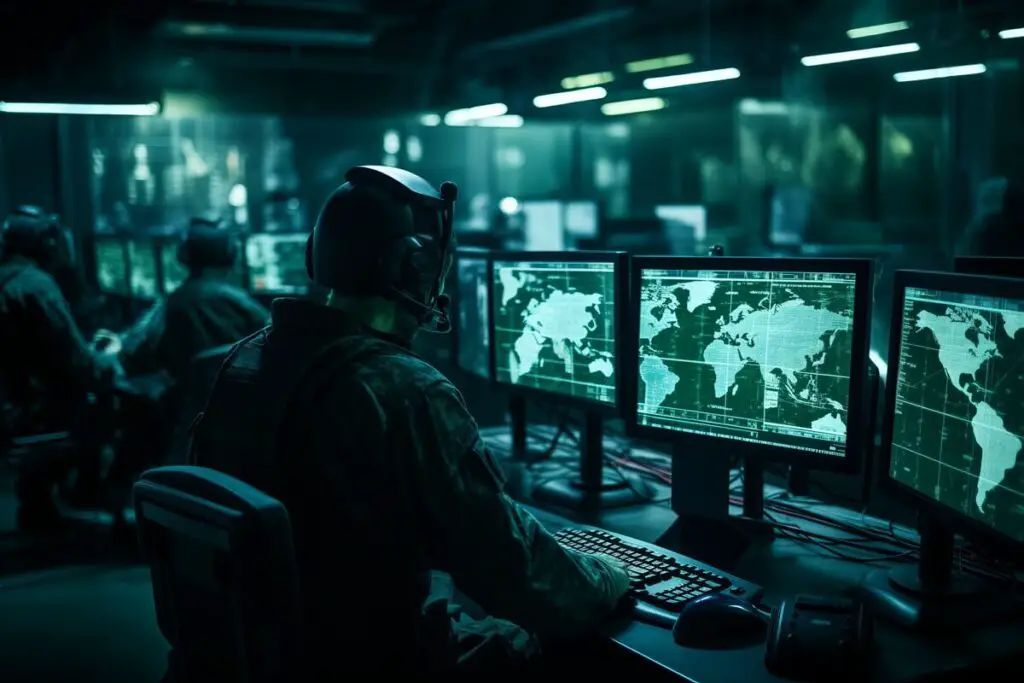
Cyber war is happening all the time. Ransomware has become a new form of terrorism and hackers regularly steal millions form people on a regular basis. It could no doubt be that World War III is a global cyber war as even the poorest nations find a small group of coders and programmers to destroy the global infrastructure defined by the Internet.
Preparations go beyond anti-virus programs. Specific steps to take to prepare for cyber war include:
Protecting your finances from Cyber War
There’s more to it than cash in a mason jar. Here’s some good links for additional research:
Becoming the Grey Man in Digital Space
Get off the Internet and either become anonymous or erase yourself as a target.
Communicating Safely When the Internet Can’t be Trusted
This gets back to some of the handheld preparations we mentioned earlier like 2-way radios and HAM radio.
Basic Malware and Virus Protection Steps to Take
There’s a range of software worth downloading onto your computer and smart phone. Also remember to activate 2-step authentication that requires a second step for access to any bank, credit card or financial account you access online.
The Threat of World War AI
This isn’t about the terminator. This is about a country turning over its war-time decision making to artificial intelligence. Throughout history, victory or defeat in war was determined by good and bad decisions. AI may be given the authority to implement strategy and tactics in a time of war. The decisions will most likely be highly logical and emotionally ruthless depending on the country implementing that kind of system.
In the event of a 3rd world war ruled by AI, the next possibility is the most likely.
All of the Above
The history of emerging technologies is directly tied to the history of war. Everyone tends to focus on nuclear war as the ultimate Armageddon. In actual fact, it may be a war with a blend of every savage technology we can imagine. Nuclear powers may eventually turn to their nuclear arsenal, while less developed nation states may turn to biological warfare with the assumption that they have nothing to lose.
Even the most failed state could assemble a small team of hackers to wreak havoc on the Internet and add cyber war to the mix. When countries go to war, they seldom show restraint, and as each new weapon system enters the conflict, others respond in kind.
It gets back to one of our opening questions: Is preparing for World War III even possible? For most of us, all we can do is our best.
Perhaps there’s a more troubling observation related to the on-going and emerging events affecting many parts of the world. It may be that it’s not a question of whether or not World War III is imminent. The bigger question given the constantly evolving conflicts and their genesis in 1914 is whether World War I ever truly ended.
Like this post? Don't Forget to Pin It On Pinterest!

